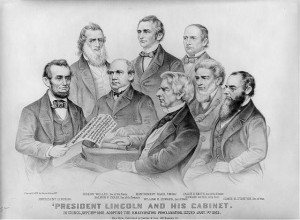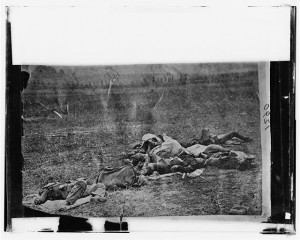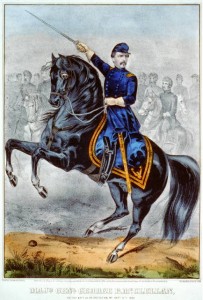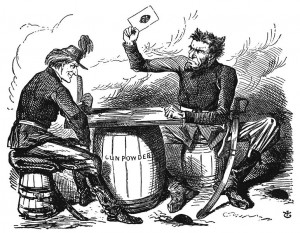Here a Democrat newspaper from upstate New York in a single column comments on three events on eight days in September: The Battle of Antietam on the 17th, President Lincoln’s Emancipation Proclamation of the 22nd, and the president’s order subjecting those who discouraged enlistment to martial law and denying the writ of habeas corpus to those same people (24th).
You can browse to Civil War Daily Gazette for those dates and get a good report on these issues. One of the things I did not realize is that the timing of the Emancipation Proclamation was tied to Mr. Lincoln’s warning to the southern states on July 25th that if they were still in rebellion in sixty days all property would be subject to confiscation. That would seem to be an important factor because as late as September 13th the president wrote that emancipation at that time would be unenforceable. The following editorial would agree that it still is unenforceable.
From a Seneca County, New York newspaper in 1862:
The Battle of Sharpsburg.
We offer no apology for publishing the thrilling narrative of the Battle of Sharpsburg, found on the first page of to-day’s paper. It was by far the bloodiest, and most fiercely contested engagement of the war. Both armies fought with a desperate valor, and an unflinching heroism, which were never surpassed on any of the historical battle-fields of the old world, – but as it was only men of the same lineage and race, trying to vanquish each other, one need not be surprised that after the day’s slaughter, it was difficult to determine which was the winner. Subsequent events, however, have demonstrated that the enemy were unwilling to renew the contest, hence their retreat on the following day, while their dead and wounded were being cared for. The Generalship displayed on both sides was of the most brilliant character. – there were no retreats, or panics in that dreadful days work, but every officer, high and low, were prompt to obey orders – supported by the rank and file – who resisted the rebel legions that were furiously hurled against them, in quick succession. The presence of the commanding officer – the gallant and invincible MCCLELLAN – on all parts of the battlefield, inspired our troops with renewed courage, and a fierce determination to conquer or die. Never did men fight more determinedly, more heroically. And yet, when one peruses the thrilling detail of this terrible struggle, the heart sickens at the thought that a people, only a few days since so prosperous and happy – men of the same lineage, and with a common destiny, should so soon array themselves in sanguinary conflict and for mutual slaughter. The thought is terrible, and the progress of events since President LINCOLN’s Inauguration seem like a horrid dream. Verily, is not this the bloodiest and most unnatural war of modern times?
_____________________________________

‘If he has the Constitutional authority to free negroes, he has a corresponding Constitutional authority to enslave them’
Proclamation of Emancipation.
President LINCOLN has finally yielded to the Abolition pressure, and issued a Proclamation, declaring all slaves free in States which shall be in rebellion on the 1st of January next. The President ought to issue another Proclamation declairing the rebel army disbanded, and then he would reach the climax of Abolition folly and madness. It remains to be seen what effect this Proclamation will have towards liberating the four millions of slaves in the Southern States. We do not believe that it will in any way disturb the status of slavery. Proclamations against slavery, and those in arms against the Government, amount to nothing unless we have the power to enforce them. So far we have made poor headway towards subduing the rebel army, or penetrating the enemy’s country. The whole world will laugh at the impotence of this mere Paper Proclamation.It will not add to our strength, but on the other hand, and under existing circumstances, it will strengthen the rebellion three fold, and prolong almost indefinitely the horrors and miseries of this most wicked war.
The President has no power or authority for issuing a Proclamation of this character. The Constitution does not give him the power, – it is usurpation. If he has the Constitutional authority to free negroes, he has a corresponding Constitutional authority to enslave them. If not, why not? President LINCOLN we fear is fast assuming the power of an usurper, and unless the people arouse themselves to the dangers by which we are threatened, all hopes of a free people will be blasted and withered, and we soon numbered among the nations that have gone down in blood and disaster.
_______________________________
THE President has issued a proclamation against discouraging volunteer enlistments and prohibiting other disloyal practices. – The writ of habeas corpus is suspended in regard to all persons arrested, and confined in military prisons. What next, Mr. President?
This image is used at Wikipedia’s article on the Emancipation Proclamation in the section on “Political Impact” – where you can read more about Democrat party reaction.



